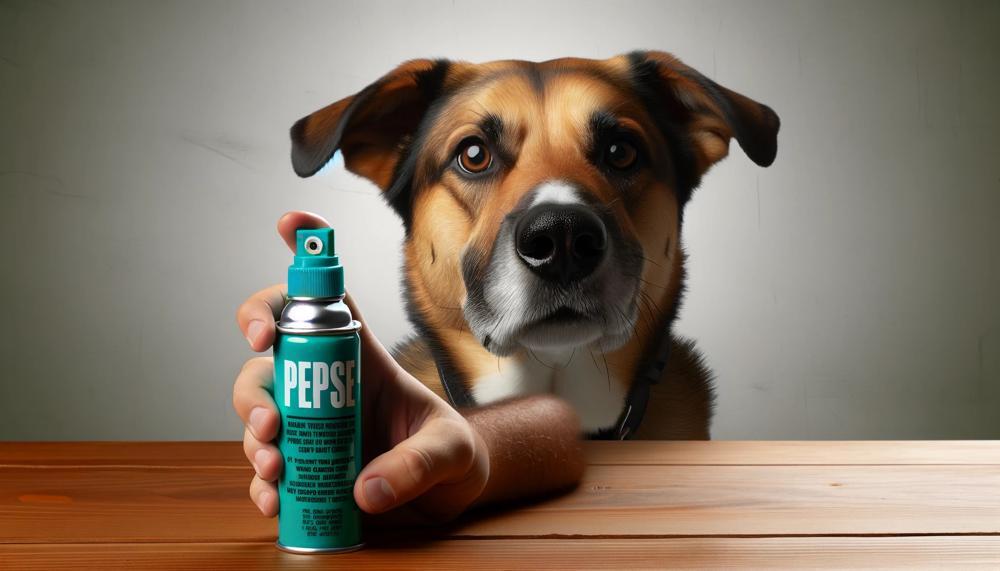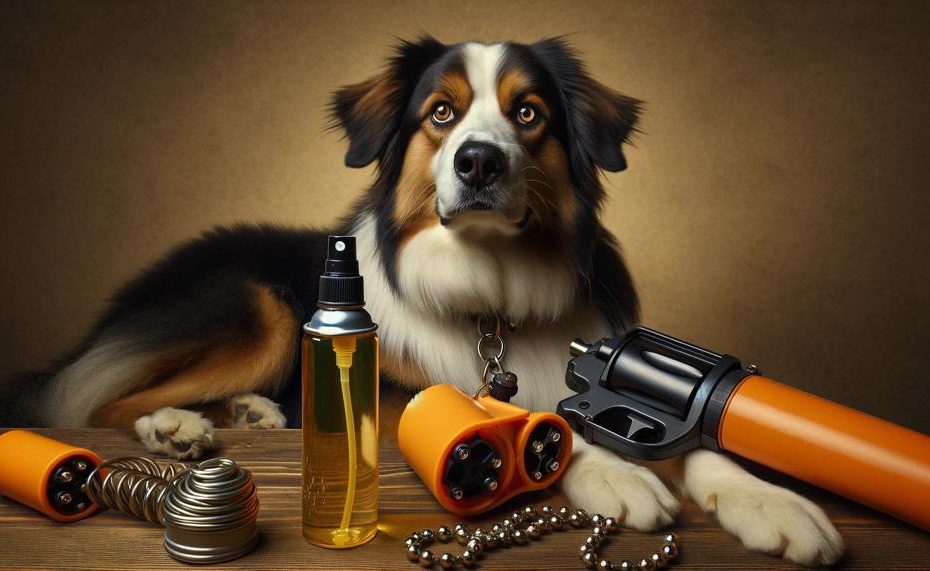Have you ever found yourself feeling uneasy while walking your beloved dog in a new or unfamiliar area?
Are you constantly on guard, worrying about potential dangers that could harm your furry companion during your daily walks?
While pepper spray has long been used as a self-defense tool for humans, the question remains: is it an effective means of protection for dogs as well?
So, does pepper spray work on dogs?
Yes, pepper spray can be effective at deterring dog attacks. It can irritate a dog’s skin and eyes, and can incapacitate them for hours. Pepper spray can also disable a dog’s sense of smell and make it difficult for them to see. However, pepper spray can have unpredictable and potentially harmful effects on dogs.
So let’s delve into the world of pepper spray and its potential impact on our canine companions.
Contents
- 1 Will Pepper Spray Hurt A Dog?
- 2 Is It Legal To Use Pepper Spray On A Dog?
- 3 Can You Use Pepper Spray On A Dog Off-Leash?
- 4 What Happens If You Spray Pepper Spray On A Dog?
- 5 Will Pepper Spray Work On An Attacking Dog?
- 6 Will Pepper Spray Stop A Pitbull?
- 7 What Do You Do If Your Dog Gets Pepper-Sprayed?
- 8 How Long Does It Take To Recover From Being Pepper-Sprayed?
- 9 Conclusion
Will Pepper Spray Hurt A Dog?
While pepper spray is not lethal to dogs, it can cause temporary discomfort and irritation. That said, it should only be used as a last resort and with caution.
To better understand the potential effects of using pepper spray on dogs, let’s take a look at the table below:
| Effect | Description |
| Irritation | Burning, itching, and swelling in the eyes, ears, and throat |
| Incapacitation | Temporary immobilization of the dog |
| Duration | Around 30 minutes or more, depending on the strength and amount used |
| Efficacy | According to a study by the US Postal Service, pepper spray is 93% effective in stopping dog attacks. |
| Factors to consider | The type of pepper spray used, size and breed of dog, and responsible use as a last resort only. |
It’s important to note that pepper spray should only be used as a self-defense tool when faced with an aggressive dog. Using it irresponsibly or as a means of punishment can have serious consequences for both the dog and owner.
In fact, a responsible use of pepper spray can effectively deter dog attacks without causing any long-term harm.
Is It Legal To Use Pepper Spray On A Dog?
In most cases, the answer is yes. If you are using pepper spray to defend yourself from a dog attack, there are usually no legal consequences. However, it’s worth noting that the legality of using pepper spray on animals may vary depending on your state or country.
Generally, self-defense laws allow individuals to use reasonable force to protect themselves from an imminent threat. This includes using pepper spray on a dog that is attacking you or your property. However, if pepper spray is used in situations that are not considered self-defense, such as for punishment or without just cause, there may be legal repercussions.
To ensure that you are using pepper spray responsibly and within the boundaries of the law, it’s important to familiarize yourself with the specific laws and regulations in your state or country regarding self-defense and the use of pepper spray. Additionally, it’s recommended to only use pepper spray as a last resort and to try to de-escalate the situation before resorting to its use.
It’s crucial to understand that while pepper spray can effectively deter an attack from an aggressive dog, it can also have serious consequences if used improperly. It’s important to follow proper instructions for use and avoid spraying it directly into the dog’s eyes or face.
Can You Use Pepper Spray On A Dog Off-Leash?
Using pepper spray on an off-leash and potentially aggressive dog is not a recommended course of action. Although it may appear to be a convenient and swift solution, it can result in severe damage and should only be used as a last resort after exhausting all other options.
To better understand the severity of using pepper spray on a dog, let’s consider the potential consequences. The chemical compounds found in pepper spray can cause intense pain and temporary blindness, as it is derived from a chili plant. When sprayed onto a dog’s face, it causes them to instinctively close their eyes, cough, and tear up. This can result in severe discomfort for at least 30 minutes, depending on the strength and amount of spray used.
Moreover, using pepper spray on a dog can have long-lasting effects on their physical and mental well-being. It can lead to psychological trauma and fear, causing them to become more aggressive or fearful in the future. Additionally, if the spray is ingested by the dog, it can cause further complications and even death.
What Happens If You Spray Pepper Spray On A Dog?
Using pepper spray on a dog may seem like a quick and easy solution for self defense, but it’s important to understand the potential consequences and use it responsibly. Unlike humans, dogs have a heightened sense of smell, making them particularly sensitive to the chemicals in pepper spray. This means that even small amounts can cause significant discomfort and harm.
In fact, when sprayed on a dog’s face, pepper spray can cause their eyes to close tightly, making it difficult for them to see. It can also irritate their nasal passages and throat, making it hard for them to breathe normally. The burning sensation can last for up to 30 minutes or longer, depending on the strength and amount of pepper spray used.
Using pepper spray on a dog can have long-term effects on their health. The chemicals in the spray can cause damage to their respiratory system and vision. It can also lead to changes in their behavior, causing them to become more aggressive or fearful.
Therefore, before resorting to pepper spray as a self defense tool against an aggressive dog, it’s important to consider other options first. For example, using loud noises or throwing objects can often startle the dog and give you time to escape. Additionally, carrying a citronella spray or a personal alarm can also be effective in deterring a dog without causing harm.
Will Pepper Spray Work On An Attacking Dog?
Pepper spray, derived from the chili plant, can be a useful tool in stopping a dog from attacking. When sprayed directly into the dog’s eyes, nose, or mouth, the active ingredient, capsaicin, causes intense irritation and pain.
This can temporarily incapacitate the dog and prevent it from attacking.
However, it is important to note that pepper spray should only be used as a last resort when your life is in danger.
Will Pepper Spray Stop A Pitbull?
When it comes to stopping a pitbull attack, pepper spray may be an effective choice, but it is not a guaranteed solution. Its effectiveness depends on proper usage and precise targeting.
Pepper spray is a well-known self-defense option against dogs, including pit bulls. It is made from a chemical compound found in chili peppers that causes severe irritation to the eyes, nose, and respiratory system when sprayed onto the face. This reaction aims to immobilize the attacker and provide the victim with an opportunity to escape or seek assistance.
However, with pit bulls, pepper spray may not always work as effectively as it would against other dog breeds. These dogs are known for their high tolerance to pain and their determination when attacking. This means that even if they are sprayed with pepper spray, they may continue their attack until they physically cannot do so.
Another aspect to consider is how difficult it can be to accurately aim and spray a pit bull with pepper spray during an attack. In a high-stress situation, it can be challenging to target the dog’s face and spray enough chemical to incapacitate them. This could result in missing the target or not spraying enough of the substance.

It is also essential to note that pepper spray should not be considered a substitute for proper dog training and handling. While it can be an effective tool for self-defense, it should not be solely relied upon for protection against dog attacks.
What Do You Do If Your Dog Gets Pepper-Sprayed?
In the unfortunate event that your canine companion falls victim to pepper spray, it is crucial to act quickly and efficiently.
The first step is to remove them from the source of the spray, as continued exposure can worsen the effects.
Next, flushing their eyes with water is essential to help alleviate the burning sensation and prevent any potential damage to their vision.
Your dog may also exhibit signs of respiratory distress, so be sure to monitor their breathing and seek medical attention if necessary.
How Long Does It Take To Recover From Being Pepper-Sprayed?
The time it takes for a dog to recover after being pepper-sprayed is not definite, as it depends on the severity of the exposure and individual reactions.
However, most dogs usually take around 30 minutes to 1 hour to fully recover from the effects of pepper spray.
| Factors that influence recovery time: | ||
| Type and potency of pepper spray used: | The strength and concentration of the pepper spray can affect recovery time, as it takes longer for the effects to wear off with stronger sprays. | |
| Amount of pepper spray used: | The more pepper spray is used, the longer it will take for a dog to recover. | |
| Extent of exposure: | A dog that has been sprayed directly in the face or had direct contact with the pepper spray may take longer to recover compared to one that was sprayed on their body. | |
| Individual reactions: | Similar to humans, dogs may have different reactions to pepper spray. Some may recover faster while others may take longer. |
It is worth noting that while most dogs will fully recover within an hour, some may experience residual effects such as burning sensation or redness for a few hours following exposure. In rare cases, dogs may even suffer temporary blindness if they were sprayed directly in the eyes.
If your dog is exhibiting severe symptoms such as excessive drooling, difficulty breathing, or extreme agitation, it is best to seek immediate medical attention. A veterinarian may prescribe medication or a topical ointment to alleviate your dog’s discomfort and aid in their recovery.
In addition to seeking professional care, there are steps you can take at home to help your dog recover from being pepper-sprayed. These include:
- Flushing their eyes with water: Use a gentle stream of lukewarm water to flush out any remaining pepper spray particles from your dog’s eyes. Be sure to do this carefully to avoid causing further irritation.
- Bathing them with mild soap: Use a mild soap and lukewarm water to gently wash off any pepper spray residue from your dog’s fur. This can help remove any lingering effects and prevent further discomfort.
- Providing comfort and reassurance: Your dog may feel frightened, confused, or in pain after being exposed to pepper spray. Offer them a calm and secure environment and provide soothing words and physical reassurance to help them relax.
- Monitoring their condition: Keep an eye on your dog’s recovery progress and watch out for any concerning symptoms. If their condition does not improve or worsens, seek professional care immediately.
Conclusion
In conclusion, pepper spray can serve as a valuable tool in deterring dog attacks, but it should be used with caution and only as a last resort.
While it may cause temporary discomfort for dogs, it is a non-lethal option that can prevent further harm to both the dog and its owner. However, responsible use within legal boundaries is crucial.
Alternative methods should also be considered before turning to pepper spray. In the event of exposure, immediate care and support for the affected dog are vital for a speedy recovery.





